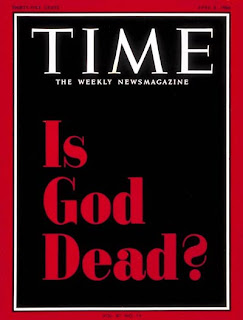The Death of God: A Belated Personal Postscript
 Last Sunday the service was taken by various members of the congregation so there'll be no address/post from me this week. Instead I simply post a link to an article written in 1976 by James W. Woelfel who is professor of philosophy and religious studies at the University of Kansas, Lawrence entitled The Death of God: A Belated Personal Postscript.
Last Sunday the service was taken by various members of the congregation so there'll be no address/post from me this week. Instead I simply post a link to an article written in 1976 by James W. Woelfel who is professor of philosophy and religious studies at the University of Kansas, Lawrence entitled The Death of God: A Belated Personal Postscript.I'm re-reading the major texts of the death of God theology at the moment to see whether some of what they said might be of help in contemporary attempts to get people who call themselves religious to talk constructively with those who describe themselves as secular and non-religious and vice versa. Woelfel's piece is not central in the literature but the following paragraph so resonated with my own position that I simply place it before you for your consideration.
I hasten to add that I am not so naïve as to think that the demise of the transcendent God within my own interpreted experience entails the universalized conclusion that he does not exist. I have become increasingly impressed by the inescapably contextual character of all our "ultimate concerns." I can appreciate the fact that all sorts of people deal with existence in terms of faith in the sovereign God of Abraham, Isaac and Jacob. On questions of ultimate meaning, none of us knows for sure who is closer to the mark. But in my own ongoing struggle to make sense of the Christian context of life- and world-interpretation, I find basic elements of that context which I simply cannot render coherent any longer, and I earnestly wonder how other persons manage to.


Comments